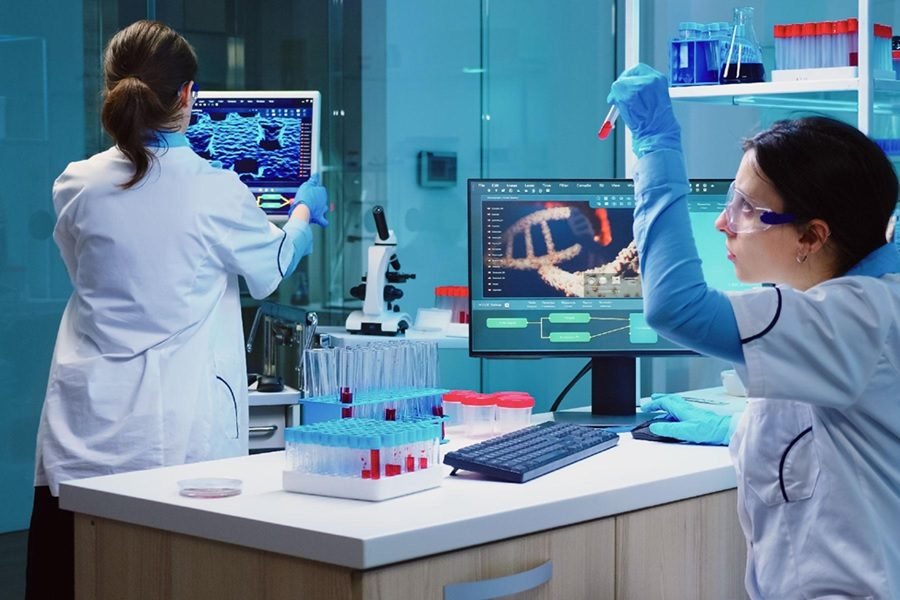The biotechnology industry is one of the most dynamic and innovative sectors of the economy because it harnesses biological organisms and systems to generate new products and technologies. New innovations based on biology are at the forefront of addressing some of the greatest worldwide challenges, including health, food security, environmental stewardship, and industrial performance. For students interested in life sciences and using scientific knowledge to real real-world problems, various courses are available for career opportunities. Let’s look at the various programs, admission requirements, and potential career opportunities for graduates.
Undergraduate Programmes in Biotechnology Engineering
Tech in Biotechnology
The B.Tech in Biotechnology is an integrated programme aimed at applying engineering concepts to biological sciences. This four-year programme includes theoretical knowledge and practical skills that prepare students for various careers.
Important Subjects:
- Molecular Biology
- Biochemistry
- Genetic Engineering
- Bioprocess Engineering
- Immunology
- Environmental Biotechnology
- Downstream Processing
The students are exposed to the main sciences in the initial two years, and then they shift to sepcialised courses in the subsequent semesters. The curriculum has significant practical exposure through laboratory sessions, workshops, industry interactions, and summer internships.
B.Sc. Biotechnology
This three-year interdisciplinary degree merges biological sciences with technological applications. It focuses on the integration of biology, chemistry, and computer science to formulate solutions in healthcare, agriculture, and environmental science.
Major Subjects:
- Molecular Biology
- Drug Design
- Genomics
- Bioinformatics
- Proteomics
- Genetic Engineering of Plants and Animals
- Fermentation Technology
- Medical Biotechnology
The students start with basic principles in biology and chemistry and move on to advanced fields like genetic engineering and bioinformatics. The course promotes experiential learning through laboratory experiments, research projects, seminars, and industrial training, which prepares the students for both higher studies and professional life in the emerging field of biotechnology.
Postgraduate Programme: M.Sc. Biotechnology
The M.Sc. Biotechnology is a rigorous postgraduate degree programme for advanced study and applications of biotechnology in industries such as health, agriculture, and environmental management. The focus of the program is to support student learning with a detailed understanding of molecular biology, genetics, bioinformatics, and bioprocessing, together with important research skills.
Key Subjects:
- Molecular Biology and Genetics
- Biochemistry and Enzymology
- Cell Biology
- Microbiology and Immunology
- Bioprocess Engineering
- Genomics and Proteomics
- Bioinformatics
- Biostatistics and Data Analysis
The programme emphasises professional laboratory training in a group/or as an individual. Each student completes both a research project and a thesis in collaboration with industry and/or academic mentors.
Eligibility Criteria for Admission
Tech in Biotechnology
- Academic Qualification: The candidate should have passed the 12th standard in PCB or PCM from a recognized examination board or equivalent.
- Admission Basis: Admission is made solely on merit exam, as determined by the university, based on AICTE guidelines.
B.Sc. Biotechnology
- Academic Qualification: Applicants should have passed the 12th standard with Physics, Chemistry, and Biology (PCB) from a known board of examination.
- Admission Basis: Merit in the qualifying exam is the basis for admission.
M.Sc. Biotechnology
- Academic Qualification: The candidates should possess a Bachelor’s degree in B.Sc. in Biotechnology, CBZ (Chemistry, Botany, Zoology), B.Sc. in Agriculture, or allied subjects from a recognised university.
- Admission Basis: The admission will be based on merit in the qualifying exam, as decided by the university.
Promising Career Opportunities
Graduates of a biotechnology engineering programme are most in demand in a diverse number of industries due to the interdisciplinary nature and universal applicability of the discipline.
- Pharmaceutical and Health Sector: Positions in R&D for new drug development, vaccine development, drug trials, quality control, manufacturing and regulatory. Job roles include Research Scientist, Clinical Research Associate, Quality Assurance/Control Analyst, and Production Executive.
- Biotechnology Companies: Positions in small niche biotech companies that are working on genetic engineering, genomics, proteomics, cell therapy, stem cell research, personalised medicine, and many more. Position titles can vary wildly from bench scientists to product development specialists.
- Agriculture and Food Sector: Supporting crop development (e.g. disease-resistant or high-yield crops), food processing, food safety, and development of bio-pesticides and bio-fertilizers.
- Environmental Sector: Bioremediation-focused careers such as careers in waste management, careers in biofuel production, and careers in environmental monitoring.
- Forensics and Diagnostics: Using molecular biology techniques in forensic science, or producing diagnostics kits for diseases.
- Bioinformatics and Data Science: Using computational knowledge in genetics, infection control epidemiology, population genomics, and medicine to work with large biological datasets.
- Industrial Biotechnology: Those employed in industries that use biotechnological processes to manufacture enzymes, chemicals, and bioplastics.
Biotechnology engineering is at the forefront of science and innovation, offering groundbreaking solutions in areas such as food technology, healthcare, agriculture, and environmental management. With ample undergraduate and postgraduate courses, students gain both theoretical background and practical exposure to address real-world challenges. Pursuing a biotech engineering career guarantees an individual professional development and allows individuals to contribute significantly to global health and technological progress.
About Author
The author has several years of experience in education as a life sciences teacher, helping students begin their careers in biotechnology and engineering. She has an excellent academic and educational background and helps simplify complicated concepts and helping young minds realise their possibilities.

